The tragedy of the commons is where there is a resource of some kind which is essentially free for all. This means that each individual who is in a position to profit from that resource brutally exploits it, until there is nothing left but a big mess. The fact that everyone will be worse off after the resource is gone doesn’t stop people from getting as much as they can, scrambling to haul away anything not nailed down, before the next guy comes along to grab what is left.
The solution is to avoid unowned or collective resources.
If an individual owns the resource in question, a resource that is worth money, then they have an extremely keen interest in making sure that the resource isn’t brutally exploited to the point where problems arise. This is not only because the resource will generate income over time, but also because the owner will be obligated to spend money in order to clean up the mess.
But what if there is a privately owned commodity that isn’t generating income right this minute?
There is a closed restaurant near my craphole apartment. Behind the shuttered building is an equipment shed.
A homeless man managed to crawl inside soon after the restaurant closed up, and he gleefully took up residence. It seems that the shed was where the paper napkins were stored, and our hobo protagonist used them for toilet wipes when he would visit the bushes. While on our walks, the dogs and I would dodge little brown-smeared tumbleweeds imprinted with the logo and name of the popular restaurant chain. Plastic bags started to appear, tucked away in hiding places around the abandoned property, filled with human feces. The interior would soon become steamy as the sun baked the moist contents.
I had no idea at the time as to why he was collecting and saving his own waste. But, as future events will prove, the hobo was a canny and far thinking individual.
The street where the main building is situated is a busy thoroughfare. Thriving businesses line either side of the road, with this increasingly deteriorated property standing out like a sore thumb. I’d see the owner wander through every so often, giving a prospective buyer or renter a guided tour. But no one ever signed on the dotted line. I had no idea as to why, unless they were put off by bags of human poo and crappy napkins blowing in the breeze.
Cleaning crews started to show up the day before the tours, causing the hobo to make himself scarce while all the trash was picked up. Things would be fresh smelling and clear of debris for a short time, but then the saved feces would be brought to bear. When the hopeful client would be shown around the property they couldn’t help but notice strategically placed piles of freshly decanted poo, ripe and steaming from being held inside a clear plastic bag and stored in the sunshine.
An effort was made to keep the hobo out of the shed by padlocking the doors, but the locks would be broken off within minutes of the owner passing out of sight. No matter how expensive the lock, no matter how elaborate the lock plates or how firmly affixed, the doors would be opened. This game of cat and mouse, owner and hobo, went on for more than a year.
And then the owner had a brainstorm. He had the doors to the shed removed!
This had the effect of destroying the value of the shed as shelter against the elements. The homeless man lit off for goodness knows where the very same day, and I haven’t seen him since. Left behind was a collection of pitiful, and extremely smelly, personal belongings the hobo had gathered from nearby trash dumpsters.
Yet another cleaning crew came by, and hauled away the trash. This time, without a territorial vagabond waging a defensive war, the property remained free from stench and garbage.
The dogs and I took a walk down that way a few minutes ago. A new crew is hard at work on the building, rewiring the electricity and fixing the plumbing. Looks like either a new owner has acquired the deed, or a new lease has been signed. Either way, it appears as though this prime spot of real estate will soon boast a working business.
The idea here is that the shed represented an extremely attractive resource to the homeless man, in that it offered shelter from the rain and wet. By temporarily removing that resource, the owner destroyed the attraction. This saved the property for the intended purpose of hosting a business.
(Cross posted at my self defense blog, Hell in a Handbasket.)
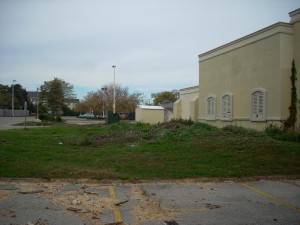
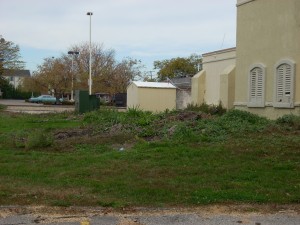
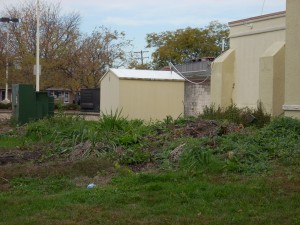
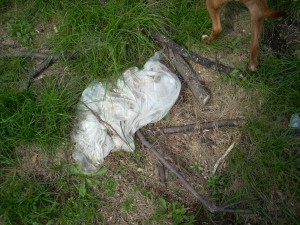
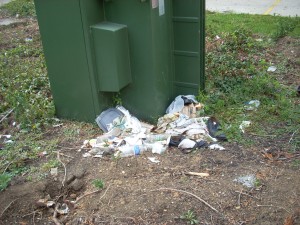
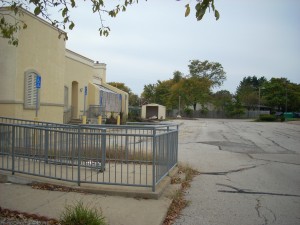
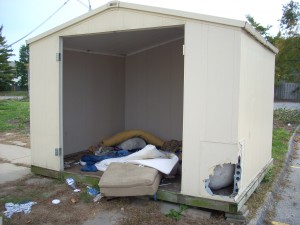
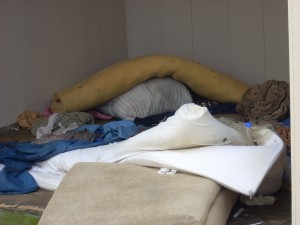
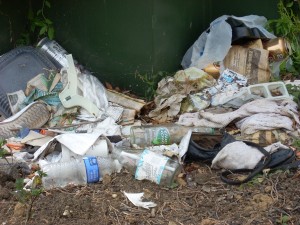

That shed looks pretty cheap. I would have just probably torn down the whole thing.
Pardon me for getting all Austrian School in your face, but I’d like to clarify that ownership by an individual is not necessary to avoid the tragedy of the commons.
There are various historical examples of group- or community-managed resources being successfully used and maintained: grazing land, farmland, fishing grounds, etc.
The problem really only occurs when absolutely nobody has any say in the use of the resource, or more often, a single monopoly entity actively forbids anyone from managing it.
A good example of the latter is the Feds coming into a disaster area and failing to maintain order or protect property, then threatening to shoot anyone else who tries to fill the gap.
“A good example of the latter is the Feds coming into a disaster area and failing to maintain order or protect property, then threatening to shoot anyone else who tries to fill the gap.”
A related example is giving away free gasoline, as Christie decided to do in NJ. This is how our foreign aid wrecked Africa until we got mad at how little they appreciated it and stopped. Now the normal microeconomy is coming back and Ghana, for example, is booming. Why anyone expects a bureaucrat to understand economics is a mystery.
The Economist has a big piece on Ghana recently.
It occurs to me that the precondition for efficient ownership is the rule of law regarding human rights including human rights to exclusive property ownership, use, change and transfer. The incentive for both is economic scarcity. Scarcity without an effective rule of law and you get Somalia or Afghanistan: rule by warlord/gangs/tribal elders and very little productive use or creation of anything of value and accompanied by huge dead weight costs to determine and cause/secure distribution of what little there is either naturally occurring, produced in hope of avoiding confiscation or has been taken by force from another group. There may be parts of some of our decayed inner cities that are pretty close to those conditions. Detroit comes to mind.
Mike
Well stated.